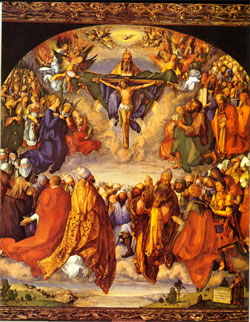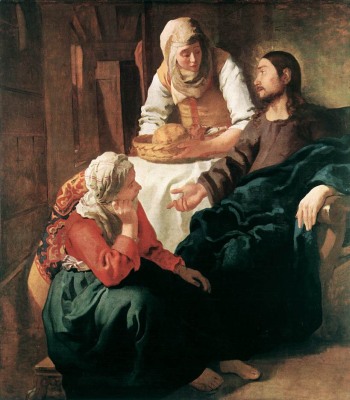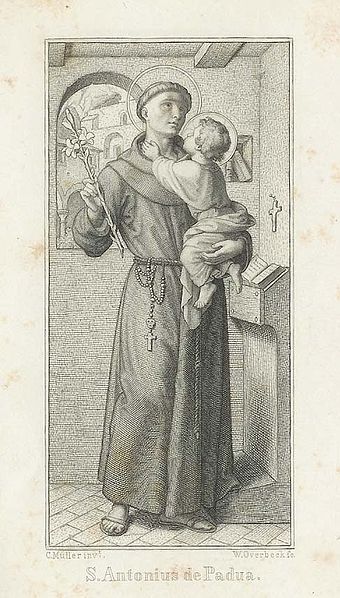
Painting by Albrect Dürer (1471-1528)
All Saints' Day
Solemnity celebrated on the first of November. It is instituted to honour all the saints, known and unknown, and, according to Urban IV, to supply any deficiencies in the faithful's celebration of saints' feasts during the year.
In the early days the Christians were accustomed to solemnize the anniversary of a martyr's death for Christ at the place of martyrdom. In the fourth century, neighbouring dioceses began to interchange feasts, to transfer relics, to divide them, and to join in a common feast; as is shown by the invitation of St. Basil of Caesarea (397) to the bishops of the province of Pontus. Frequently groups of martyrs suffered on the same day, which naturally led to a joint commemoration. In the persecution of Diocletian the number of martyrs became so great that a separate day could not be assigned to each. But the Church, feeling that every martyr should be venerated, appointed a common day for all. The first trace of this we find in Antioch on the Sunday after Pentecost. We also find mention of a common day in a sermon of St. Ephrem the Syrian (373), and in the 74th homily of St. John Chrysostom (407). At first only martyrs and St. John the Baptist were honoured by a special day. Other saints were added gradually, and increased in number when a regular process of canonization was established; still, as early as 411 there is in the Chaldean Calendar a "Commemoratio Confessorum" for the Friday after Easter. In the West Boniface IV, 13 May, 609, or 610, consecrated the Pantheon in Rome to the Blessed Virgin and all the martyrs, ordering an anniversary. Gregory III (731-741) consecrated a chapel in the Basilica of St. Peter to all the saints and fixed the anniversary for 1 November. A basilica of the Apostles already existed in Rome, and its dedication was annually remembered on 1 May. Gregory IV (827-844) extended the celebration on 1 November to the entire Church. The vigil seems to have been held as early as the feast itself. The octave was added by Sixtus IV (1471-84).
Source: Catholic Encyclopedia
Liturgical reforms since Vatican II have suppressed the vigil and octave for this feast which are mentioned in the last line of the above article.A Sermon delivered by
His Grace Archbishop Marcel Lefebvre
on the Feast of All Saints
November 7, 1978
at Ecône, Switzerland

In the name of the Father and of the Son and of the Holy Ghost. Amen.
My dear friends and my dear brethren:
The Church has the custom of associating the souls in Purgatory with the Feast of All Saints. In fact, from this evening (vespers of All Souls Day), the Church asks us to pray for the souls in Purgatory and tomorrow the entire day is consecrated to them. The priests who will celebrate three Masses tomorrow, to beseech Our Lord to deliver the souls from Purgatory, may apply to each of their Masses a plenary indulgence for the souls in Purgatory. This is why during these few moments I would like to draw your attention and to have you reflect upon the reality of Purgatory and upon the devotion which we should have for the souls who are suffering in this place of purification.
FIRST OF ALL, does Purgatory exist? If one were to believe all that is written today, even by members of the Catholic Church, one would be tempted to believe that Purgatory is a medieval fable! NO! Purgatory is a dogma—a dogma of our Faith. Whoever refuses to believe in Purgatory is a heretic. In fact, already in the thirteenth century, the Second Council of Lyons solemnly affirmed the existence of Purgatory; then, in the fifteenth century the Lateran Council again affirmed the reality of Purgatory. Finally, the Council of Trent, in particular, solemnly affirmed against the negations of the protestants, the necessity in preserving the Faith, of believing in the existence of Purgatory. It is therefore certain that this is a dogma of our Faith which is especially affirmed and supported by Tradition—more than by Sacred Scripture. Sacred Scripture does, however, offer passages which make allusion, as clearly as possible, to the existence of Purgatory. We have moreover, in an epistle which is used by the Church in Masses offered for the intention of the souls in Purgatory, the account of the "Machabees" where Judas Machabee sent a sum of twelve thousand talents to Jerusalem asking the priests to offer a sacrifice for the intention of the soldiers who had died in combat in order that they might be delivered from their afflictions and enter heaven. Sacred Scripture adds: It is a salutary thought to pray for our dead. Saint Paul also makes allusion to the souls in Purgatory when he says that certain souls enter heaven immediately and other quasi per ignem; that is, who enter heaven as well but as by fire making allusion certainly to the purification necessary for these souls who would not be perfectly prepared to enter heaven. It is by these allusions and particularly by Tradition which is transmitted to us by the Apostles and by the Fathers of the Church, that the Church has founded her Faith in the existence and in the reality of Purgatory.
WHY DOES PURGATORY EXIST? It exists because we must obviously enter heaven in the most perfect purity. It is inconceivable that souls may enter the vision of God— enter into union with God, a union which surpasses all that our mind is able to imagine, all that we are able to conceive, enter into Divinity Itself, to participate in the light of God— with any dispositions which would be contrary to this light, contrary to the glory of God, to the purity of God, to the sanctity of God— it is inconceivable! This is why those who have died in the state of grace but are not perfectly purified from the penalty which is due to sin after the sin has been pardoned; and also those who die with venial sins must pass through this place of purification which renders them worthy to be present before God in the Blessed Trinity. It is then something which is entirely normal, for we must not forget that even if the sin is pardoned, there remains in us a disorder which was established by the sin. Without a doubt, the moral fault no longer exists because it has been pardoned by the Sacrament of Penance; however, it remains that our soul has been wounded, our soul has suffered a disorder which must be repaired. This may be compared in a certain way to the penitent who has sinned by stealing from his neighbor. Not only must he accuse himself to Our Lord in the Sacrament of Penance and receive absolution, but he must also reimburse the sum which was stolen. One may compare this, I would say, to all the sins which we have committed. We have created a disorder; we have created an injustice and we must repair this injustice even after the sin has been pardoned. This is why the souls in Purgatory remain there until the moment which they are perfectly purified from the penalties due to their sins which have been forgiven.
WHAT IS THE STATE of the souls in Purgatory? Are the souls in Purgatory able to acquire merit for themselves by which they might abridge their time of purification? No, henceforth the souls in Purgatory are not able to gain merit for themselves.
Why? Since they are no longer here upon earth, they are no longer like us; in the state in which one is able to gain merit; because we have the choice to make and by the fact that we choose good in place of evil we merit a recompense. The souls in Purgatory no longer have this choice to make. They are definitively fixed in their grace, in sanctifying grace. They have the certitude of being among the elect, and this causes a profound joy, an unalterable joy. They know that henceforth they are destined for heaven. But they suffer as well from an indescribable suffering because they know much better than we what God is and what He has promised us by grace—the glory that is waiting for us in heaven. They suffer severely from the thought that they are not yet able to approach God and to live with Him for eternity. They are also tormented by remorse at the thought of the goodness of God and of the charity of God of which they are witnesses. They understand well the charity which God has had for them: For they had sinned and separated themselves from God and it is for this that they suffer. They know that they suffer justly for the sins which they had committed and to be purified in order to arrive in the glory of the Lord. Thus, as a consequence the souls in Purgatory are not able to abridge their sufferings.
How then would they be able to render their admittance into heaven more rapid? They count upon us. Yes, they count upon us. It is we who, by the unity of the Mystical Body, are able to merit for them. The union that we in the Church have with the souls in Purgatory and the fact that we are able to merit for these souls are founded upon the unity of the Mystical Body. The Church Suffering and the Church Militant are united in Our Lord Jesus Christ.
Since we are able to merit for them we may ask Our Lord Jesus Christ in our prayers and, in particular, in the Holy Sacrifice of the Mass, that the souls in Purgatory be more rapidly delivered from their sufferings; and, indeed, we must do so. It is a duty for us for these souls who are suffering count upon us for their deliverance from Purgatory. We are able to do so therefore by our prayers and, in particular, in offering the Holy Sacrifice of the Mass. We are able to do so by our penances, penances which we must do as well in order to atone for the penalty which is due to us for sins which have been pardoned and in order to diminish our Purgatory, and if it pleases God, and if God so wishes, that we not pass through Purgatory but rather go directly to heaven to join Him. We must therefore perform sacrifices for the souls in Purgatory and also profit from the treasure which the Church places at our disposal, the treasure of the merits of the saints, of all those who have lived here on earth. The Church has a treasury of merits which she is able to place at the disposal of souls who truly wish to employ these merits for the souls in Purgatory. The Church asks us to perform certain prayers, to acquire these merits and to apply them to the souls in Purgatory. This is what we can do for them! It is a considerable encouragement for us, an encouragement to sanctify ourselves. If we truly understood what the souls in Purgatory suffer, we would do all that we possibly could for our part to deliver them and to avoid Purgatory ourselves.
IF WE TRULY UNDERSTOOD WHAT THE SOULS IN PURGATORY SUFFER WE WOULD DO ALL THAT WE POSSIBLY COULD FOR OUR PART TO DELIVER THEM AND TO AVOID PURGATORY OURSELVES!
Concerning the indulgences which the Church gives: It is good to know that these repose upon a perfectly known truth of the Church in which we must believe, the reality of the Mystical Body of Our Lord Jesus Christ. The Council of Trent itself requests that we avoid entering into the subtlety of the number of indulgences, of any calculation which would be made and of any estimation more or less exact. One may wonder for example, if by one Mass said at a privileged altar, one Mass consequently which is said at an altar where one receives a plenary indulgence that one may apply to the souls in Purgatory, it is absolutely certain the soul for whom the indulgence has been applied will be immediately delivered from its penalties and go to heaven. As a rule-yes. Theoretically—yes. Why? It is because the plenary indulgence is given specifically by the Church for the complete remission of the penalties which are due to a sin after it has been pardoned. However, as the Council of Trent well explained, it depends upon God to give this indulgence. This indulgence then depends upon God. God sees the dispositions of souls and consequently it is He who is ultimately the judge of all things and of that which these souls must suffer in Purgatory and of the penalties which they must expiate. As a consequence, one is not able to arrive in an absolutely mathematical manner at the conclusion that from the moment one has performed a certain act or a certain prayer the soul is necessarily and absolutely delivered from Purgatory. This depends upon Divine Justice. We should hope and we should think that God judging all the merits which have been acquired by the Church applies them to these indulgences and we may truly hope that these souls are delivered.
LET US LIVE IN UNION WITH THE SOULS IN PURGATORY AND LET US ASK THE BLESSED VIRGIN MARY WHO ASSISTED AT THE BURIAL OF HER SON, TO ASK HIM TO GIVE US THE LOVE AND RESPECT WHICH SHE HAD FOR THE BODY OF HER DIVINE SON.
This is why we must meditate upon the reality of Purgatory, to be united to the souls of our brethren, of our parents, of our deceased friends and of the entire innumerable multitude of souls who have no one among their acquaintances who prays for them. We must then pray often for the souls in Purgatory. The magnificent liturgy of the dead thus inspires us. Unfortunately, one must say that today the manner in which the Reform [of Vatican II] has touched these prayers and modified them has been a great sorrow for the Church.
In addition, I think it is good to make allusion equally to the reform of the Council [Vatican II] concerning the cremation of bodies. I think that one may make allusion to this at the moment when one is speaking of our dear deceased. It is written in Canon Law that those who, in one manner or another, express the desire to have their bodies cremated after their death are to be deprived of ecclesiastical burial. It is the law that they are to be thus deprived. Without a doubt the Church, at the Council, has changed this law but these things are abominable! Since from the beginning of its existence the Church has willed that bodies, which are temples of the Holy Ghost, which have been sanctified by Baptism, sanctified by the Sacraments, sanctified by the presence of the Holy Ghost, sanctified by the reception of the Sacrament of the Holy Eucharist, that these bodies be venerated. It is noted in Canon Law that even the members of a Christian—of a Catholic— which are amputated in a hospital be interred and they must not be burned. See what great veneration the Church has for members which have been sanctified by the grace of Our Lord Jesus Christ! We then, absolutely, refuse this abominable custom which is, moreover, a masonic custom. Canon Law makes allusion to the associations in which it is requested that bodies be cremated and these associations are precisely masonic associations. One truly wonders how one has been able to accept such things without being—without having been influenced by these masonic associations. We must maintain a very great respect for the bodies of the deceased, for those who have been sanctified and we must bury them as Christians have always done. We must honor our dead and honor our cemetaries. The tombs and graves should be maintained perfectly in order to show the faith which we have that the bodies will one day be resurrected.
There you have, my dear brethren, our thoughts on the occasion of All Souls' Day which we will celebrate tomorrow. Let us live in union with the souls in Purgatory and let us ask the Blessed Virgin Mary who assisted at the burial of her Son, to ask Him to give us the love and respect which she had for the Body of her Divine Son. Let us ask Him to give us also the respect for the bodies of those faithful who have died, our deceased friends and deceased relatives.
In the name of the Father and of the Son and of the Holy Ghost. Amen.
Translated by Eugene R. Berry at Ecône—November, 1978







